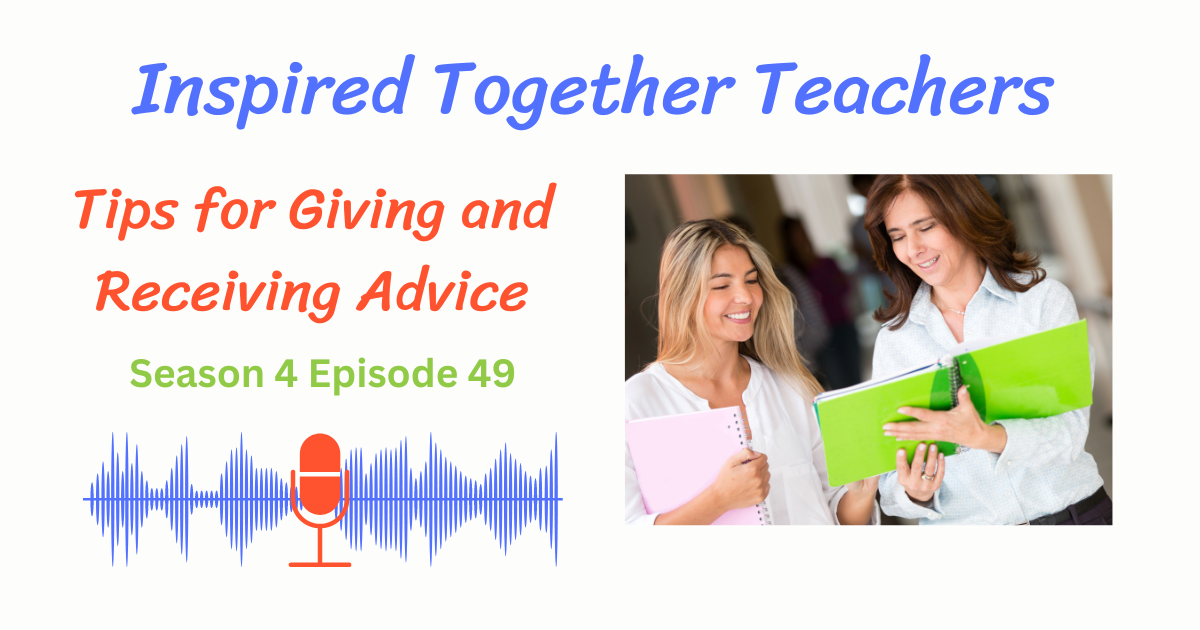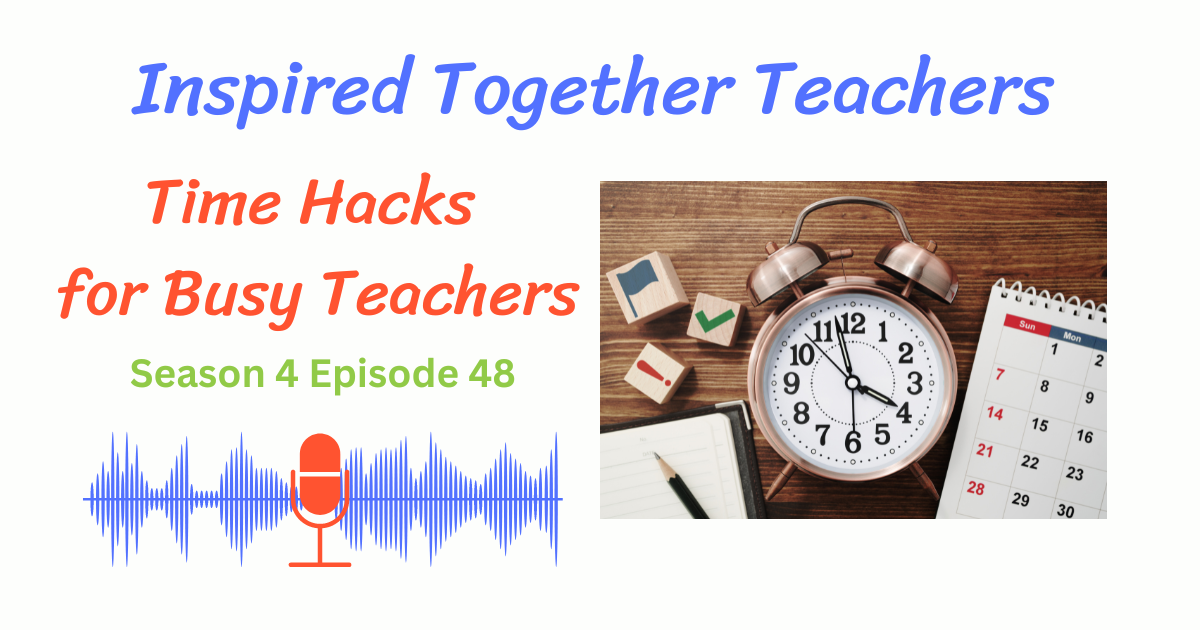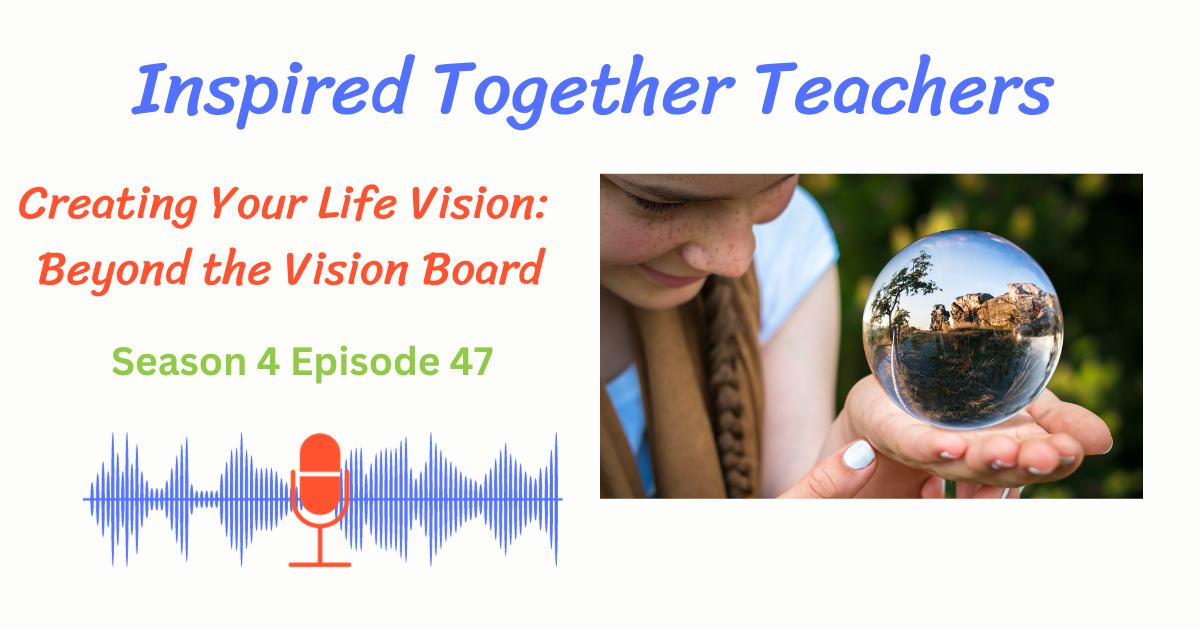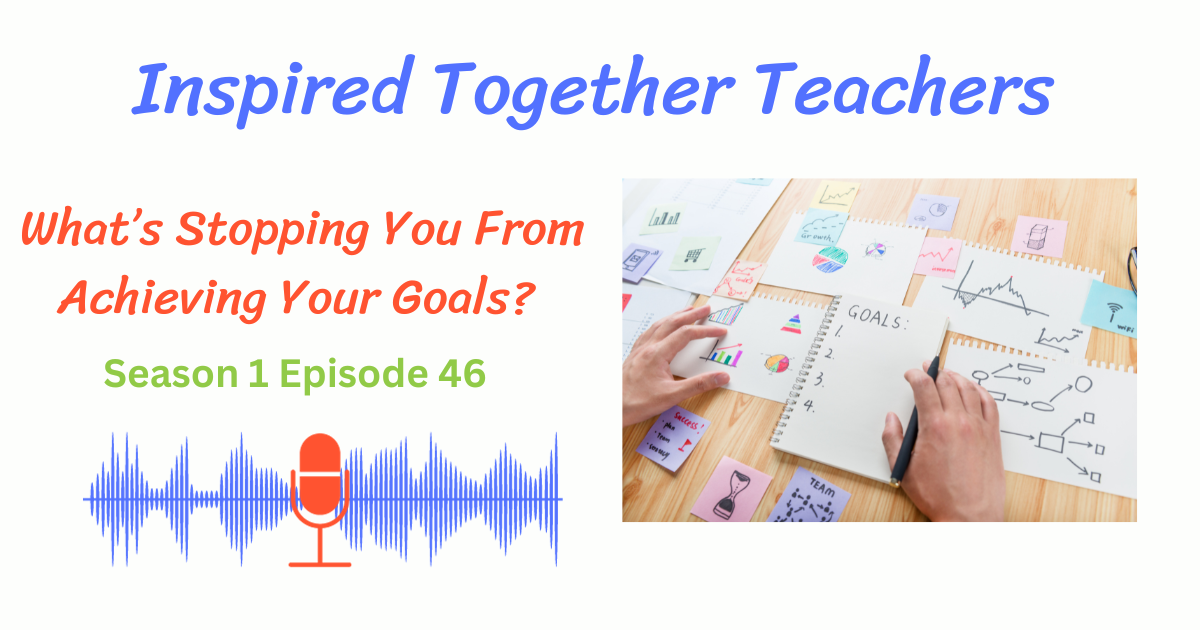Teaching with Laughter and Tears S. 4 E. 50
Check out this episode to learn how both laughter and crying are good for you and how to find more laughter in your life and classroom.
Show notes:
Episode summary:
Have you laughed at school recently? Have you cried? The acts of both laughing and crying have a significant impact on our physical and psychological health. Both laughter and tears help us to regulate our minds and bodies. Laughing and crying are gifts that our body gives to all of us to help us respond to life’s challenges and celebrations. In this episode we will explore why we laugh and cry, how laughing and crying are good for us, and how you can add more laughter to your life and classroom.
In this episode:
The following is an outline of the things we discussed in the show. To hear all of the stories and examples, please listen to the podcast episode.
Introduction:
Laughing and crying are some of our body’s most authentic responses. When you think about it, both laughing and crying are fascinating ways that our subconscious helps us to regulate our bodies and emotions and respond to the negative and positive events of our lives.
Laughter and tears are a universal language, transcending culture and language boundaries. Laughter and tears are a baby’s first language no matter where in the world they are born.
Though laughter and tears may seem like contradictory responses, they both happen subconsciously to help us navigate our world. Even if we often give little thought to the benefits of laughter and tears, we truly need both.
For those of you who teach littles, you know that both laughing and crying are a daily activity. Children and teens often do both, and regularly have the bonus of laughing so hard that they cry.
However, as we get older, and life takes on a more adult and serious tone, we make conscious efforts to control these emotions, attempting to keep more of a middle ground- decreasing the open flow of tears in front of others and controlling the laughter.
As grown-ups, our bursts of laughter are often reserved for especially fun or funny events. We often save our tears until we are alone. We no longer roll on the floor laughing about a knock-knock joke with pure abandon like we did as a second grader, nor do we burst out into tears when we are disappointed with an answer someone gives us like we did as pre-teens. That is all good, as it helps us to stay within the norms that society sets. However, by stifling these responses we can also stifle why our bodies need these reactions to help us cope with life.
On average, people laugh a half million times in their lifetime. Children laugh about 400 times per day. Adults only laugh approximately 20 times per day. Some studies even suggest that adults laugh on average only 8 times per day! How sad is that?
Why do we adults laugh so little compared to children?
Mainly, it’s because we have less opportunities and society is less forgiving of adults with extreme emotions than we are for kids. So, as adults we try and stifle those giggles in a meeting because we don’t want to appear that we don’t have our emotions under control or we avoid crying in the principal’s office because we don’t want to appear emotionally weak.
Natalie Dattilo, an Instructor of Psychology in Harvard Medical School’s Psychology Department gives reasoning as to why adults don’t laugh enough. As she told the Harvard Gazette, “As adults, we don’t laugh nearly as much as we used to. The idea that we would have fun, play, and make time for those things is often seen as a reward or something you have to earn or something you do when the work is done. But the work is never done.”
Today we’re going to explore the bodily reactions that cause us to laugh and cry, the benefits to our bodies of laughing and crying, and ways that we can add more laughter to our lives.
Why we laugh and cry
Laughing and crying are our body’s way of regulating our emotions and processing the events of our lives. Because we are humans, it is natural to have emotions. Joy and sorrow are two of those crucial emotions. Laughter and crying are our bodies’ natural tendencies to express joy and sadness.
Though they look and sound different on the surface, both laughing and crying provide the same kind of psychological and physical stress release. They both help us to end the stress cycle. For more detailed information about the stress cycle, listen to Episode 7, Prevent, Eliminate and Reduce Stress.
There are several parts of your brain that work together to connect your emotions and the physical reactions to them such as laughing and crying. In order to laugh and cry your brain’s limbic system, brainstem, cerebral cortex and hypothalamus must all work together to get those muscles moving to produce the sound of laughter or the falling of tears. How cool that our body and brain know how important laughter and crying are to our well-being!
Laughing and crying are both byproducts of our body’s defense mechanism. So when we are feeling stressed, uncomfortable, overwhelmed in a negative way, overwhelmed in a positive way, full or joy or whatever big emotion we are feeling, the act of laughing or crying helps our body to release the energy building up in our system. This is our body’s unconscious attempt to regulate all that energy.
Sometimes, you don’t even need to feel the strong emotion to start laughing. Sometimes just hearing another person laughing can cause you to laugh too. People laugh about 30 times more when they are with other people than when they are alone. That is what the phrase “laughter is contagious” matters so much.
It is also true that we tend to mirror others so if you spend a lot of time with people who are sad, you are more likely to feel sad yourself. You’ve heard the expression misery loves company. It’s called mood contagion.
Do you remember the old Saturday Night Live character Debbie Downer played by Rachel Dratch? She was so pessimistic that no one wanted to be around her because she would bring the mood down. Today, the label “Debbie Downer” has come to mean anyone who negatively affects the mood of a space.
Keep that in mind, you probably don’t want to become a Debbie Downer!
The benefits of laughing and crying
The benefits of crying
You’ve probably heard someone say, “It’s nothing a good cry wouldn’t help.” When we cry, we release certain chemicals into our body. Of most importance, when we cry we release endorphins that reduce our pain and make us feel better. This doesn’t work for the tears we shed when we cut onions or get dirt in our eyes, but is it true for tears we cry that are associated with our emotions. There are numerous studies that indicate that letting out sad emotions with tears is better for our mental health than suppressing them.
Have you ever been holding in an emotion and then just had a good, long cry? Did you notice how much lighter you felt afterwards? Getting those emotions out through tears feels so much better than suppressing them for long periods of time.
The benefits of laughing.
You have likely heard someone say, “Laughter is the best medicine”. When we laugh, our body decreases stress hormones like adrenaline, epinephrine, and cortisol. Decreasing stress hormones is good for our heart and boosts our immune system. It can reduce the tension in our bodies and can also help to improve our mood. Laughter can decrease our heart rate and blood pressure and can relax tense muscles. And the best part is that laughter improves our mood and lowers stress and anxiety almost immediately!
Laughing, like crying, also releases endorphins into our brain that make us feel good. These endorphins can reduce pain and give us an overall sense of well-being. Some studies even show that laughter increases cells in our bodies that remove bacteria which can then help prevent cancer and inflammatory diseases. Laughter also fills us dopamine and oxytocin which is considered the “empathy hormone.”
Did you know that when you laugh, you move about 30 facial muscles at the same time? And if you have a hearty, cheerful laugh, you move a third of the muscles in your body. All those muscles moving, and the air flow that increases the motion of your diaphragm, supplies oxygen and blood throughout your body which helps your digestive system and metabolism.
There is a doctor, Patch Adams, a real person played by Robin Williams a movie, who believes that our physical wellness is highly connected to our emotional wellness. He uses humor and comedy as part of his treatment. He believes that laughter can actually help physically heal us.
How to add more laughter to your life
You know yourself best and you understand your sense of humor better than anyone. So you need to cater this to yourself but here are just a few suggestion for adding more laughter to your life.
1. Add opportunities for play, silliness and creativity in your life.
Buy your family that new board game you saw advertised. Family game night is sure to bring about some smiles and laughter. Bring your friends together for a movie and snack night. Pick a movie that cracks you up every time you see it. You might even want to add a silly theme. Go with your friends to that cake decorating class, even if you know your cake will be a disaster. In fact, a “cake fail” may bring about more laughter and smiles than a beautifully decorated cake.
Remember the Pinterest fail Easter cake tht was all over social media a few years ago? The original post was by someone who had made a beautiful cake in the shape of lamb. Then when others tried, they failed miserably and posted their pictures of their lambs that were lopsided and had no neck and just looked ridiculous. It was very funny!
2. Smile more and make efforts to laugh.
Faking a smile can cause your body to smile more; faking a laugh, will actually rewire your brain to let you know that it is okay to laugh. Then you will laugh more. Smiling is a great place to start because smiling is the first step of laughter. Smile more, laugh more, even if it doesn’t come naturally. The more you smile and laugh, the more you rewire your brain. Today is a great day to start that new habit.
Can’t think of anything that will make you smile quickly? Do quick internet search for funny cat videos or look at photos of a fun vacation. You can also watch a laughter yoga video on you tube. Laughter yoga is best done in a group but in the absence of a group of people, a YouTube video will suffice.
3. Incorporate humor into your classroom.
When the kids laugh, laugh with them. We have so much to learn about laughing freely from kids. Incorporate jokes, play silly songs, have kids debate humorous topics. Who would be a pickier house guest, Sponge Bob or Minnie Mouse? Why? Incorporate a joke of the day or have a joke book handy for times when you have a free minute.
You could also show a short, funny video. We Are Teachers has a blog post called 25 School-Appropriate Funny Videos for Kids When You Have 5 Free Minutes. This is an excellent resource because they compiled short funny videos that could be shown in any classroom.
We also have a very popular post on our blog called 8 Simple Ways to Create a Joyful Classroom. There are some fun ideas in there as well.
Maya Angelou once said, “Laugh as much as possible, always laugh. It’s the sweetest thing one can do for oneself and one’s fellow human beings.”
There is an old Joni Mitchell song from the 1970s in which she sings, “Laughing and crying, you know it’s the same release.” Joni was on to something before she had neuroscience to back her up. We now know how good both crying and laughing are for us. Welcome the tears when they come. Increase the laughter in your life. Your body and mind will thank you.
Recap:
Laughter and tears are both good for us. They are our way of regulating our minds and our bodies. The next time you need to cry or give a good belly laugh, remember that you are doing your body good. Laughter really is the best medicine so look for ways to add laughter to your life and your classroom. Your body will thank you!
Quote:
“Laugh as much as possible, always laugh. It’s the sweetest thing one can do for oneself and one’s fellow human beings.”
Maya Angelou
Resources mentioned in this episode:
https://news.harvard.edu/gazette/story/2023/01/a-laugh-a-day-keeps-the-doctor-away/
https://www.weareteachers.com/funny-videos-for-kids/
Related Episodes/Blog Posts:
8 Simple Ways to Create a Joyful Classroom
Connect with the Inspired Together Teachers Community:
Download our FREE resource: The Inspired Teachers Guide to Taking Back Your Life.
Website: https:www.inspiredtogetherteachers.com
Instagram: Inspired-Together-Teachers
Facebook: Inspired Together Teachers
Facebook Teacher Warriors Group: Teacher Warriors Facebook Group
Linked In: Inspired Together Learning
More About Inspired Together Teachers:
Are you a teacher struggling to balance your best work with your best life?
If you are dedicated and caring but often overwhelmed and exhausted, join us at Inspired Together Teachers. We’ll give you inspiration, strategies and tips that help you navigate life’s challenges as a stronger, more confident, and more joy filled person, both in and out of the classroom.
Inspired Together Teachers will give you practical tools to experience more of what matters most in your life.
Co-hosts Paula Schmidt and Michele Vosberg are award winning educators with the experience and skills to help teachers thrive in life and work. They’ve taught at all levels, worked with thousands of teachers, and conducted workshops around the world. They are also the authors of the #1 best-selling book The Inspired Teachers Journal: A Weekly Guide to Becoming Your Best Self.
Paula and Michele would love to have you to join them on their quest to lived inspired lives.






